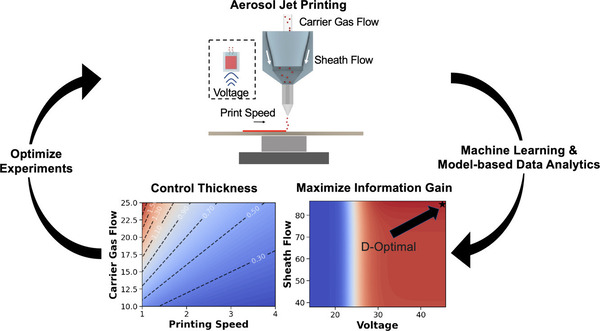
Wang, K., Zeng, M., Wang, J., Shang, W., Zhang, Y., Luo, T. and Dowling, A.W., 2023. When physics-informed data analytics outperforms black-box machine learning: A case study in thickness control for additive manufacturing. Digital Chemical Engineering, 6, p.100076. [link]
Abstract: Aerosol jet printing (AJP) has emerged as a promising noncontact additive manufacturing method for high-resolution printing for a wide range of material systems. A key challenge limiting the broader adoption of AJP in the material science community is the lack of methods to precisely control thickness. Herein, we develop a model-based design of experiment (MBDoE) framework that integrates physics-informed models, nonlinear regression, and information criteria to postulate, select and calibrate the best model to describe and optimize the AJP manufacturing process. Starting with already available data from system commissioning (e.g., prior single variable sensitivity analysis), four candidate physics-informed models are postulated and trained. MBDoE identifies a single additional optimal experiment to validate these predictive models with quantified uncertainties, which are then used to determine the best experimental conditions to control printed film thickness. As a comparative benchmark, the analysis is repeated using the same dataset with nonparametric Gaussian process regression (GPR) model that does not incorporate physical information. Using MBDoE principles, we find that only five experiments are necessary to calibrate the nonlinear physics-informed parametric model, and with said limited data, this model outperforms the black-box machine learning GPR model. This key result underscores an emerging trend in the data science community: incorporating physical information into predictive models often drastically reduces the data requirements. Leveraging MBDoE further increased the data efficiency. By design, the proposed data science framework is general in nature and can be easily extended to other experimental and additive manufacturing systems beyond AJP.